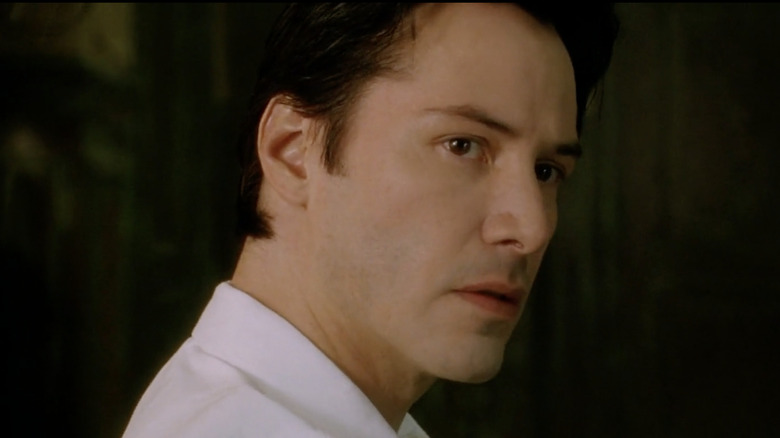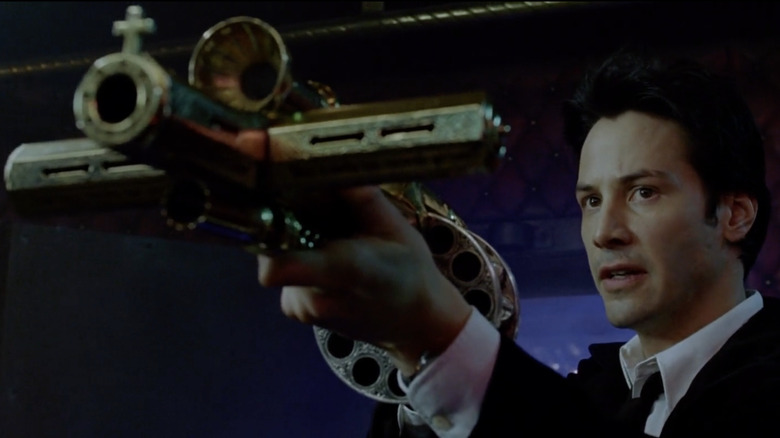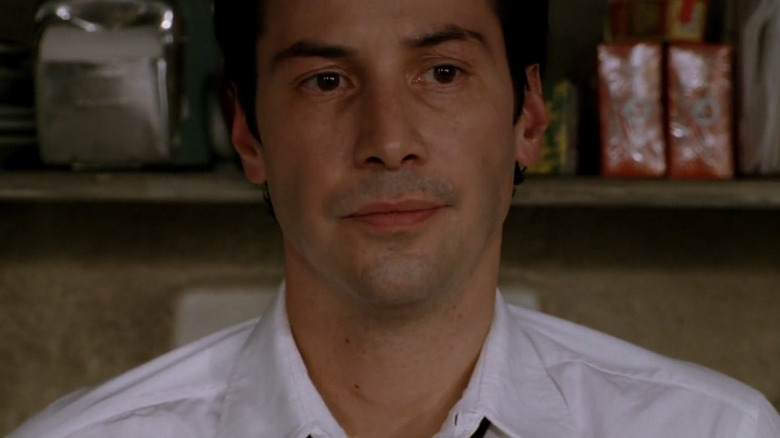How Keanu Reeves Helped Shape The Philosophy Of Constantine
In 1989, Keanu Reeves became famous for playing one-half of the time-traveling stoner duo in "Bill & Ted's Excellent Adventure." In his early career, the actor mastered the art of clueless expression and airheadedness, and no one would've pegged him as action hero material, but Reeves spent the '90s distancing himself from Ted 'Theodore' Logan. Over the next decade, Reeves saved busloads of innocents, skydived with Patrick Swayze, and escaped the Matrix. Whoa.
In 2005, Reeves took a break from playing a heroic savior to portray the chain-smoking demon hunter John Constantine. The demon slayer spends his free time sending Earth-dwelling demons back to the pits of Hell, but strictly for selfish reasons. As a suicide survivor, he battles demons in an attempt to persuade God to forgive him, so he can escape an eternity in Hell. Constantine was drastically different from the characters that brought Reeves into the public eye, but audiences enjoyed his foray into the dark side, and the actor enjoyed analyzing the different aspects of a darker character.
Despite his early career playing ditzy stoners and do-gooders, Reeves became engrossed in the complexity of Constantine's story and helped make the film's philosophy more relatable.
Spiritual battle
On the surface, the story of John Constantine is all about religion and spirituality. The demon slayer is caught in the middle of the never-ending war between God and Lucifer, and often operates in God's favor, but he doesn't officially belong to either side. Having been rejected by God and hated by Lucifer, Constantine spends his life sending evil creatures to Lucifer's realm knowing he's destined to spend eternity with them.
Constantine is a rough, sarcastic, and selfish character, but it's impossible not to feel sorry for the guy. He's stuck in the middle of an age-old war between two omnipotent beings and, no matter how many demonic entities he kills or innocent lives he saves, he's destined for damnation. He's desperately trying to stay out of Hell and earn his way into Heaven, but Constantine isn't shy about thumbing his nose at either of the big guys. He equates God to "a kid with an ant farm" and mocks Lucifer right to his face. Can't really blame the guy for being a bit salty about the way his life turned out, I guess.
In the end, Constantine makes a Christlike sacrifice, earns God's forgiveness, and is given one more chance to prove he's worthy of Heaven. At first glance, "Constantine" functions as a critique of faith and religion, but Reeves found a fundamental human experience in the demon hunter's story.
Reeves' take on Constantine
While faith and religion are large themes throughout the film, Reeves told IGN that he believes the Constantine character is the most important aspect of the film:
"The piece itself is using icons and a platform in a kind of Catholic heaven-and-hell, god-and-the-devil, human souls, fighting for those... But I find that the piece itself, Constantine, because of the fact that he knows, and I was hoping that these concepts could become a platform that are humanistic, that the journey of this particular hero is hopefully relatable to; even though they're such fantastic characters and situations, that it's still a man trying to figure it out."
Instead of focusing on the fantastical aspects of the movie, or the good vs. evil debate, Reeves wanted to make Constantine relatable to the audience. Underneath his sarcasm and bravado, Reeves believed that Constantine, like all of humanity, is simply trying to survive a situation he doesn't understand:
"My impact in terms of what it was and what it became, one of the expressions is in the end of the film, he's like, 'I guess there's a plan for all of us. I had to die twice just to figure that out. Like the book says, he works his works in mysterious ways. Some people like it, some people don't,' is mine. That's mine. And that to me was the ground for where Constantine ends up. And there's still that ambivalence of some people like it and some people don't, but there's an acknowledgement and in that acknowledgement I feel that you're watching the character who's dealing with something that happened to him that he didn't understand."
"Constantine" is, in Reeves' view, not about religion or faith, but rather about mankind's unique ability to accept and survive seemingly impossible situations.


